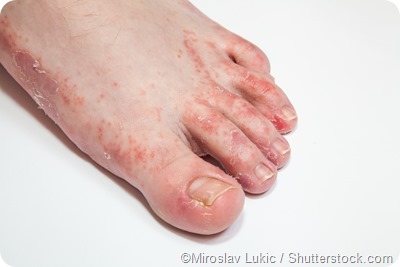Hyperhidrosis describes a condition where people sweat excessively. It is a common condition that affects either the whole body or certain body parts such as the underarms, palms, soles of the feet, groin, face or chest.
Although hyperhidrosis does not represent any serious health risk, it can disrupt a person’s usual daily activities, as well as leading to feelings of anxiety and embarrassment.
People usually sweat in response to exertion, exercise, stress, anxiety or a hot environment, but the sweating experienced with hyperhidrosis is far more excessive than this normal sweating. However, there are no guidelines for defining exactly what should be classed as “normal” sweating and it can be difficult to determine how many people suffer from the condition.
Estimates suggest that, across the world, the proportion of people affected by hyperhidrosis is around 3%, but due to a lack of awareness about treatments available, over half of those people never receive a diagnosis or treatment.
Signs of Hyperhidrosis
If a person is feeling that they sweat too much or that the problem is interfering with day-to-day life, then they may have hyperhidrosis. Some of the signs that a person may have this condition include the following:
- Avoiding making physical contact such as shaking hands with people
- Visible sweating, despite not engaging in activities that involve exertion or exercise
- Difficulty holding items such as a pen, using a computer keyboard or turning a doorknob
- Avoiding engaging in activities that typically cause people to sweat such as exercise or dancing
- Daily activities such as driving are difficult
- A significant amount of time is spent coping with sweating by having to shower or change clothes frequently
- Becoming withdrawn and self conscious
Complications
Hyperhidrosis can sometimes lead to complications, both physical and emotional, and some of these are described below.
Skin disorders
Excessive sweating can increase the risk of skin conditions such as the warts caused by human papilloma virus (HPV). Hyperhidrosis can also worsen eczema.
Fungal infections
Fungal infections of the nail and athlete’s foot are more likely to develop when a person has hyperhidrosis since the combination of excess sweat and wearing socks creates an environment suitable for fungal growth.

Body odour
Most people with hyperhidrosis do not develop body odour, despite sweating excessively, because the condition does not generally involve the sweat glands that secrete unpleasant smelling sweat (the aprocrine glands). However, the sweat can start to smell unpleasant if bacteria begin to break it down.
Emotional impact
Living with hyperhidrosis can cause stress, anxiety, and sometimes even depression. Indications that a person may be depressed include a decreased interest in activities they used to be interested in and feelings of hopelessness.
When to Visit the Doctor
A person should visit their doctor if they feel their sweating is disrupting their daily life or if they are having night sweats, which can sometimes be a sign of a more serious underlying condition. Doctors are usually able to diagnose hyperhidrosis based on a patient’s symptoms, although sometimes blood or urine tests may be required to rule out any underlying causes.
Treatment usually begins with prescribed antiperspirants, but persistent hyperhidrosis may require trying a range of different medications. In severe cases, surgery to remove the sweat glands or disconnect the nerves that trigger excessive sweating may be recommended.
Sources
- http://www.nhs.uk/Conditions/Hyperhidrosis/Pages/Complications.aspx
- www.mayoclinic.org/…/con-20030728
- www.aad.org/public/diseases/dry-sweaty-skin/hyperhidrosis#symptoms
- https://www.aad.org/public/diseases/dry-sweaty-skin/hyperhidrosis
- http://my.clevelandclinic.org/services/heart/disorders/hyperhidrosis
Further Reading
- All Hyperhidrosis Content
- Hyperhidrosis Causes
- Hyperhidrosis Treatments
- Hyperhidrosis Prognosis and Epidemiology
- Hyperhidrosis – Excessive Sweating
Last Updated: Feb 26, 2019

Written by
Sally Robertson
Sally has a Bachelor's Degree in Biomedical Sciences (B.Sc.). She is a specialist in reviewing and summarising the latest findings across all areas of medicine covered in major, high-impact, world-leading international medical journals, international press conferences and bulletins from governmental agencies and regulatory bodies. At News-Medical, Sally generates daily news features, life science articles and interview coverage.
Source: Read Full Article
